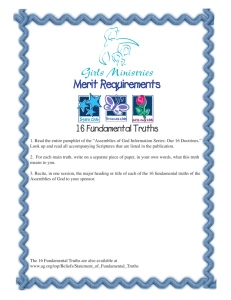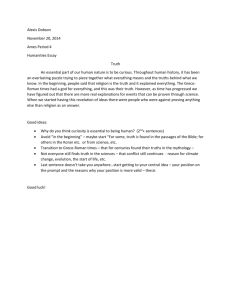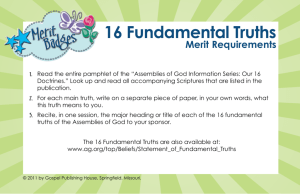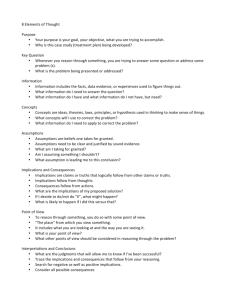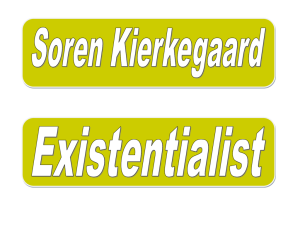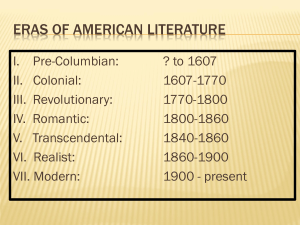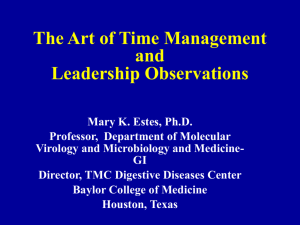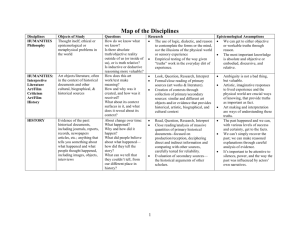Great Theoretical Ideas In Computer Science Steven Rudich Lecture 28
advertisement
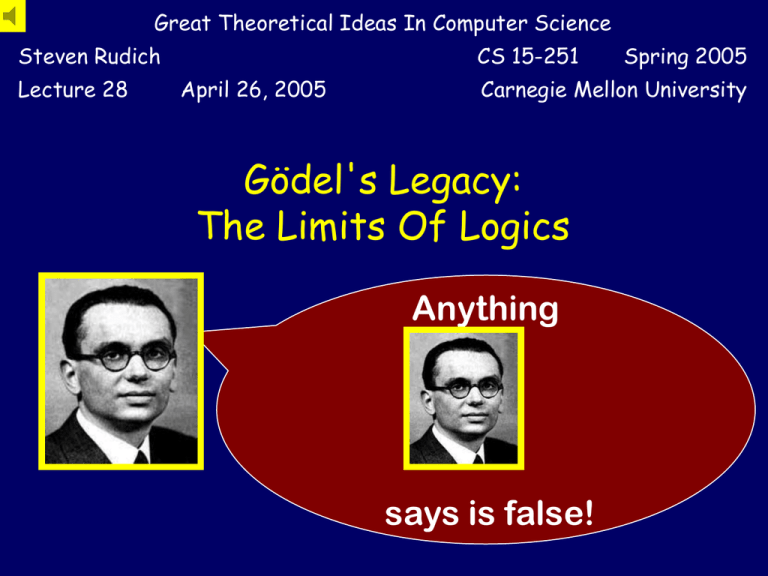
Great Theoretical Ideas In Computer Science
Steven Rudich
Lecture 28
CS 15-251
April 26, 2005
Spring 2005
Carnegie Mellon University
Gödel's Legacy:
The Limits Of Logics
Anything
says is false!
Thales Of Miletus (600 BC)
Insisted on Proofs!
“first mathematician”
Most of the starting theorems of
geometry. SSS, SAS, ASA, angle sum
equals 180, . . .
GENERAL PICTURE:
A **decidable** set of
“SYNRACTICALLY VALID
STATEMENTS S.
A **possibly
incomputable**
subset of S called TRUTHS
I.e. TRUE STATEMENTS
OF S
GENERAL PICTURE:
A computable LOGICS
function LogicS(x,y) =
y does/doesn’t follow from x.
PROVABLES,L =
All Q2S for which there is a
valid proof of Q in logic L
PROOF IN LOGICS.
If LOGIC_S(x,y) = y
follows x in one step.
Then we say that
statement x implies
statement y.
We add a “start
statement” to the
input set of our LOGIC
function.
LogicS(,S) = Yes
will mean that our logic
views S as an axiom.
A sequence of statements
s1, s2, …, sn is a VALID
PROOF of statement Q in
LOGICS iff
LOGIC(, s1) = True
And for n+1> i>1
LOGIC (si-1,si) = True
s_n = Q
Let S be a set of
statements. Let L be a logic
function.
PROVABLES,L =
All Q2S for which there is
a valid proof of Q in logic L
A logic is “sound” for a
truth concept if
everything it proves is
true according to the
truth concept.
LOGICS is SOUND for
TRUTHS if
LOGIC(, A) = true
)
A 2 TRUTHS
LOGIC(B,C)=true
and B 2 TRUTHS
) TRUTH(C)=True
If LOGICS is sound for
TRUTHS
Then
LOGICS proves C
) C2 TRUTHS
If a LOGICS is sound for
TRUTHS
it means that L can’t
prove anything not in
TRUTHS.
Boolean algebra is
SOUND for the truth
concept of propositional
tautology.
High school algebra is
SOUND for the truth
concept of algebraic
equivalence.
SILLY FOO FOO 3 is
SOUND for the truth
concept of an even
number of ones.
Euclidean Geometry is
SOUND for the truth
concept of facts about
points and lines in the
Euclidean plane.
Peano Arithmetic is SOUND
for the truth concept of
(first order) number facts
about Natural numbers.
A logic may be SOUND
but it still might not be
complete.
A logic is “COMPLETE” if
it can prove every
statement that is True in
the truth concept.
SOUND:
PROVABLES,L ½ TRUTHS
COMPLETE:
TRUTHS ½ PROVABLES,L
SOUND:
PROVABLES,L ½ TRUTHS
COMPLETE:
TRUTHS ½ PROVABLES,L
Ex: Axioms of Euclidean
Geometry are known to be
sound and complete for the
truths of line and point in
the plane.
SOUND:
PROVABLES,L ½ TRUTHS
COMPLETE:
TRUTHS ½ PROVABLES,L
SILLY FOO FOO 3 is sound
and complete for the truth
concept of strings having an
even number of 1s.
GENRALLY SPEAKING A
LOGIC WILL NOT BE ABLE
TO KEEP UP WITH TRUTH!
THE PROVABLE
CONSEQUENCES OF ANY
LOGIC ARE RECURSIVELY
ENUMERABLE. THE SET OF
TRUE STATEMENTS ABOUT
HALT/NON-HALTING
PROGRAMS IS NOT.
We have seen that the set of
programs which do not halt on
themselves – IS NOT
RECURSIVELY
ENUMERABLE.
Given any LOGIC,
we can enumerate
all of its provable
consequences.
Listing PROVABLELOGIC
k;=0;
For sum = 0 to forever do
{Let PROOF loop through all strings of length
k do
{Let STATEMENT loop through strings
of length <k do
If proofcheck(STATEMENT, PROOF) =
valid, output STATEMENT
k++
}
}
Let S be a language and
TRUTHS be a truth
concept. We say that
“TRUTHS EXPRESSES
THE HALTING PROBLEM”
iff there exists a
*computable* function r
such that
r(x) 2 TRUTHS exactly
when x2 K.
Let S be a language, L be a
logic, and TRUTHS be a
truth concept that
expresses the halting
problem.
THEOREM: If L is sound
for TRUTHS, then L is
INCOMPLETE for
TRUTHS.
THEOREM: If L is sound
for TRUTHS, then L is
INCOMPLETE for
TRUTHS.
L proves r(x) > x(x)
doesn’t halt. Thus, we can
run x(x) and list theorems
of L – one of them will tell
us if x(x) halts.
FACT: Truth’s of first
order number theory (for
every natural, for all
naturals, plus, times,
propositional logic) express
the halting problem.
INCOMPLETNESS: No
LOGIC for number theory
can be sound and complete.
Hilbert’s Question [1900]
Is there a foundation for mathematics
that would, in principle, allow us to
decide the truth of any mathematical
proposition? Such a foundation would
have to give us a clear procedure
(algorithm) for making the decision.
GÖDEL’S
INCOMPLETENESS THEOREM
In 1931, Gödel stunned the world by
proving that for any consistent axioms
F there is a true statement of first
order number theory that is not
provable or disprovable by F. I.e., a
true statement that can be made using
0, 1, plus, times, for every, there
exists, AND, OR, NOT, parentheses,
and variables that refer to natural
numbers.
GÖDEL’S
INCOMPLETENESS THEOREM
Commit to any sound LOGIC F for first order
number theory. Construct a *true* statement
GODELF that is not provable in your logic F.
YOU WILL EVEN BE ABLE TO FOLLOW THE
CONTRUCTION AND ADMIT THAT GODELF
is a true statement that is missing from the
consequences of F.
CONFUSEF(P)
Loop though all sequences of symbols S
If S is a valid F-proof of “P halts”,
then LOOP_FOR_EVER
If S is a valid F-proof of “P never
halts”, then HALT
GODELF
GODELF=
AUTO_CANNIBAL_MAKER(CONFUSEF)
Thus, when we run GODELF it will do the
same thing as:
CONFUSEF(GODELF)
GODELF
Can F prove GODELF halts?
Yes -> CONFUSEF(GODELF) does not halt
Contradiction
Can F prove GODELF does not halt?
Yes -> CONFUSEF(GODELF) halts
Contradiction
GODELF
F can’t prove or disprove that GODELF halts.
GODELF = CONFUSEF(GODELF)
Loop though all sequences of symbols S
If S is a valid F-proof of “GODELF halts”,
then
LOOP_FOR_EVER
If S is a valid F-proof of “GODELF never
halts”, then
HALT
GODELF
F can’t prove or disprove that GODELF halts.
Thus CONFUSEF(GODELF) = GODELF will not
halt. Thus, we have just proved what F can’t.
F can’t prove something that we know is true.
It is not a complete foundation for
mathematics.
In any logic that
can express
statements about
programs and their
halting behavior –
can also express a
Gödel sentence G
that asserts its
own improvability!
So what is mathematics?
THE DEFINING INGREDIENT OF
MATHEMATICS IS HAVING A
SOUND LOGIC – self-consistent for
some notion of truth.
ENDNOTE
You might think that Gödel’s theorem
proves that people are mathematically
capable in ways that computers are not.
This would show that the ChurchTuring Thesis is wrong.
Gödel’s theorem proves no such thing!
We can
talk about
this over
coffee.
